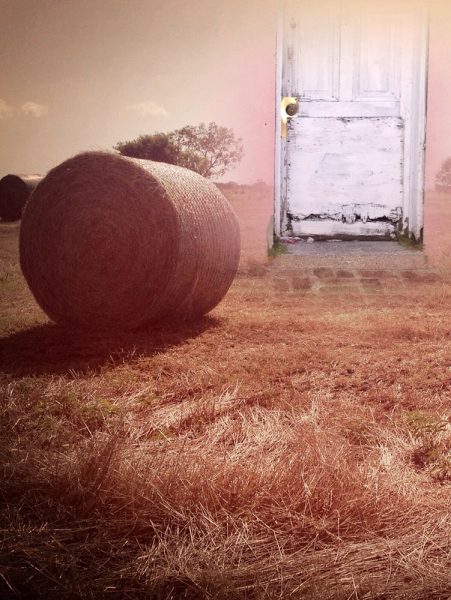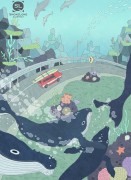First of all, I loved your story. I have to ask, did you research how certain gases affect the way the brain works?
Thank you!
You know, that’s a thought, research! I didn’t actually research anything for this story. My idea was that the gas or “attack” the characters vaguely remember is something that comes from an otherworldly source, which allowed me to avoid research about any real effects. I’m glad it seemed like I could have researched, though.
An unnamed song closes out your story. Was there a particular song you had in mind?
I was thinking about the song I’ve been singing to my son since he was born, which is this little impromptu song I made up about him and our cats to the tune of “Davy Crockett” (bizarrely). I like to think that he’d know it, that it’s a kind of pattern in his head (and in mine) that would survive.
Being a parent is influential, isn’t it? Have your writing habits changed since becoming a parent?
Well, my son is two, so I am really only recently getting into having “writing habits” at all, but I think the subject matter of my writing has definitely changed. When I first learned I was pregnant, one of the things I immediately thought about was if I was going to write “boring stuff about being a mom,” which I now recognize as some internalized misogyny that made me believe that the domestic is somehow less interesting than other topics, when in fact some of the strangest and most creative times of my life have been walking around my neighborhood at 3 in the morning, trying to get a baby to sleep, my brain wandering in exhaustion. The amount of terror I’ve experienced since having my son is so much greater than anything I’d experienced before—the terror of loss, the terror of harm, of the world, of the future. It’s pretty potent stuff. If anything, my writing has gotten darker and stranger. And I’m really having to prioritize writing, which is something I never really had to do before, as I had so much time to myself. I’ve had to be more disciplined.
The idea of terror changes with parenthood, right? Everything feels like a choking hazard or a threat.
Right! And as a person who was kinda born anxious about those things (I never went through that invincibility phase as a teenager and thought normal teenage activities were bound to kill me—booze, sex, driving a car, it was all way too much for me), I feel it so much more now and really have to learn how to regulate myself so I’m not a ball of fear all of the time.
Of course, the world is full of such horrors that choking hazards feel almost quaint now.
What does a productive writing day look like?
My current writing schedule is to write for at least an hour or two, more days a week than not. I write at night, after everything else is done, when I can relax. That’s not very much writing compared to how I used to write, but it makes me focus. I’m hoping I’ll get more and more time to write as my son gets older and my life settles down into a more familiar groove, but I feel pretty good about that schedule for now.
You write in a variety of forms. Do you have a favorite?
I love writing everything, but short stories are the hardest for me. Endings are a nightmare and I feel lucky every time one actually happens. Prose in general is still kinda tough and I am never convinced that I actually know what I’m doing. The exception is when it comes to me all at once, as most of my flash fiction does. Poetry feels the most “natural,” I guess, though I really love it all.
Do you find one form influencing the other?
The poetry influences everything. It’s my first love, and I still think in lines and sentences more than I do paragraphs and pages. My poetry background is probably why my favorite parts of my novels are always these long, parenthetical fantasias on something that isn’t central to the plot at all.
As a reader, those are the moments that stick with me. In “The Sounds and the Song” I felt like this was a central issue—two people who could not stay focused on the plot. They keep wandering off and I just want them to hold their baby. It creates a lot of tension.
God, I felt so much tension as I was writing it, just wanting to get them to that baby. The story bummed me out big time when I first wrote it, but I think it’s ultimately hopeful. The people we love can’t save us from those huge, terrible things that could happen, but they can give us some meaning and comfort even in the face of some kind of cosmic horror (or just the everyday stuff—murder, disease, decay, everything). Perhaps that doesn’t sound hopeful, but it makes me feel a little bit better.
Is this story meant to be a source of comfort then?
Well, I don’t know if that was my ultimate purpose, but what I was interested in was the question of what matters the most in moments when everything else is falling away. It seemed obvious, once I got going: the people in my life matter, ultimately. I’m not a traditionally religious person— I don’t get my comfort from thinking that God is looking out for me—but I do get comfort from relationships in my life. I think about that great book by Victor Frankl, Man’s Search for Meaning, about surviving the Holocaust, and the ways in which even in the most enormous horrors, the memory of love gave him meaning and purpose. Lately, I hold on to that.



 The core workshop of SmokeLong Fitness is all in writing, so you can take part from anywhere at anytime. We are excited about creating a supportive, consistent and structured environment for flash writers to work on their craft in a community. We are thrilled and proud to say that our workshop participants have won, placed, or been listed in every major flash competition. Community works.
The core workshop of SmokeLong Fitness is all in writing, so you can take part from anywhere at anytime. We are excited about creating a supportive, consistent and structured environment for flash writers to work on their craft in a community. We are thrilled and proud to say that our workshop participants have won, placed, or been listed in every major flash competition. Community works.